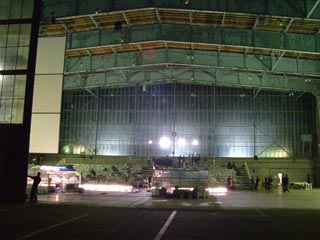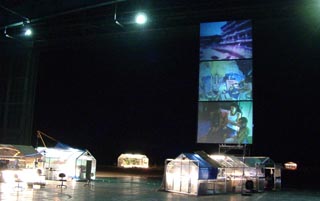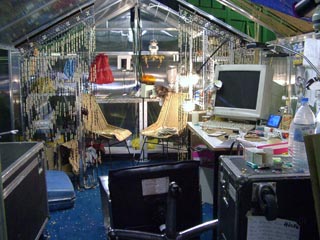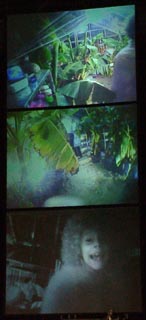August / September 2004 (updated May 2020)
German director Martin Wuttke (theatre “Volksbühne” of Berlin) took the story of Solaris to the hangar of a former airfield in a village east of Berlin. I was there. Here're my impressions.

The booklet ("Episode 17, Beyond The Schwarzschild Border")
The adaption is based upon Wuttke's idea and goes in some aspects beyond the concept of Lem's Solaris. It discusses the theory of cognition, limitations of quantum physics, philosophy of thinking and more. Language was German.
The piece started with Kris' arrival at the Solaris station and his attempts to find Gibarian. He is also confronted with Harey. Later, there are two actresses playing Harey and both appear on stage at the same time. Further, the Solaris Ocean is played by an actor who is always around: a clever way to show the omnipresence of it. The Ocean also takes part in the numerous conversations on cognition, philosophy and physics.
Another issue raised was the questions if it would be possible to prove that the crew members don't dream all this. It lead to the works of Kant about cognition of the "thing itself" (Are we able to recognize the "thing itself" as a whole or are we only recognizing the part of it that we are able to understand and see and consider that part to be the whole thing?)
hangar, view from stage
The hangar
The "stage" is a hangar of app. 100 x 100 square meters and 15 meters high. The huge gate was wide open and the actors also used part of the airfield, up to 100 meters away. The audience had been seated on a tribune inside the hangar facing the gate. In the right portion of the gate there was a videowall with three screens, one on top of the other. The cabins and the library were semitransparent greenhouses, distributed across the scenery.
Greenhouses are the cabins
A number of cameras in each greenhouse and out on the airfield were managed by a technical life crew and their imagery projected onto the videowalls. The blue and red suns were spotlights coming from the outside of the hangar thru it's glass walls.
Kris, both Hareys, Snaut, Satorius, and Solaris move from one cabin to the next. Here’s Snaut’s room:
Snaut's cabin - creative chaos?
Multiple perspectives allow the audience to follow what’s going on even in the remote cabins out on the airfield. Overlayed film fragments contribute to the athmosphere of Solaris and add abstaction layers.
multi-angle camera views
The core discussion goes as follows: In the physics of black holes there is the assumption that all known formulas and laws of whatever theory only work outside the black hole. In it, forces, gravity and everything else becomes infinite or zero. With infinity you can't do any calculations anymore. Math hits a wall. The whole theory breaks down. Between the outside world (were physiscs is just fine) and the inside there must be a sharp border, the so-called Schwarzschild border (named after the physicist Schwarzschild). The analogy here is that the humans brought all their humanity, culture, knowledge, philosophy and science to the Solaris station orbiting Solaris. But they can't recognize what the ocean actually is. They are at a Schwarzschild border and the ocean is sort of a black hole.
According to Lem, the 'guests' consist of neutrinos. Neutrinos are extremely light and superfast particles. The question is how the ocean could slow down these superfast particles to form atoms out of them. And that without any machinery or even a thought. It's just an ocean. Each crew member has his or her own 'guest', sent by the ocean to explore their inner fears, worst nightmares in an effort to understand the human nature. Lem's bottom line: How can humans explore and undertand new worlds if they are their own worst enemies, deep inside torn apart?
After all, two hours of brainfood of the best kind and definitely worthe the trip.
They handed out a program brochure with a comic-like digest of the play which I will keep side by side to my Solaris book and DVDs.
Sadly quite some critics and reviwers didn't like the performance at all. What did they expect? That Wuttke comes up with something better than Tarkovsky who created one of the best sc-fi movies of all times? Get real!



